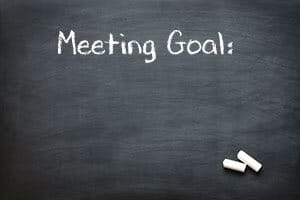It’s become quite popular for meeting facilitators, presenters, professional development administrators, and the like to begin their meetings, workshops, and sessions with these two elements:
Norms
Goals
Neither one of these elements inspire me with confidence.
Yesterday I wrote about my problems with norms. Today I’ll address my issues with goals, sometimes expressed as objective, learning targets, or (worst of all) intentions.
My problem with goals is far less simpler than that of norms. In general, defining the goals or objectives at the onset of a meeting or workshop is not a terrible idea. It’s probably not necessary if the speaker or facilitator is skilled and engaging, but it’s not automatically a mistake to outline your goals to the audience.
The problem is with the goals themselves. So often they suck. The workshop might be scheduled for 45 minutes, but when the goals are stated, I’m appalled. I find myself thinking, “This goal could be achieved in 10 minutes” or “That goal could’ve been accomplished via email” or “I don’t want to achieve this stupid goal.”
Worst of all, “I don’t even know what that goal means.”
If you’re going to establish goals for a meeting, make them worthy of the audience’s time. Make the people sitting before you believe that there is great value in your presentation. Excite them about what they are about to learn.
For example, I teach storytelling workshops for beginners several times a year. Listed at the top of every agenda is a set of goals for the day, specifically designed to reassure nervous students that they will not be required to speak except to tell me their name and the reason they decided to attend the workshop.
For many people, public speaking is terrifying. My beginner’s level workshops are designed to provide a solid foundation in storytelling without the fear of having to perform. I think it’s important to reinforce this notion before we get started, in order to relieve any anxiety that someone might be feeling.
But since I’m presenting goals at the beginning of the workshop, I establish lofty goals. Goals that the average audience member can embrace. Goals that set a high bar for myself and the content that I am about to deliver.
Here is my list:
- You’ll laugh.
- You’ll be entertained.
- You won’t need to speak a word if you don’t want.
- You’ll be a better storyteller by the end of the day.
- You’ll be given lots of breaks.
- You’ll find stories in your life that you’ve never noticed before.
- You’ll probably be one of the best storytellers in your social circle by the end of the day.
- You’ll have clear, simple, easily implemented strategies to improve your personal and professional communication and help you find and tell better stories.
Please note how my goals don’t seek to broaden understanding, increase capacity, elevate skill level, unpack content, improve synergy, or enhance collaboration.
No one has ever been inspired by these goals.
Those may actually be some of the goals of your meeting, seminar, or workshop, but they will mean nothing to the people sitting in front of you.
Even worse, they might just depress or annoy them.
If you’re going to establish goals at the onset of your meeting, seminar, or workshop, make them the kind of goals that will excite and inspire people.
If those goals don’t exist, cancel the meeting. Refund the workshop. Rethink your professional development.
Or just don’t list any goals.
It’s better to say nothing than to aggressively un-inspire your audience.









